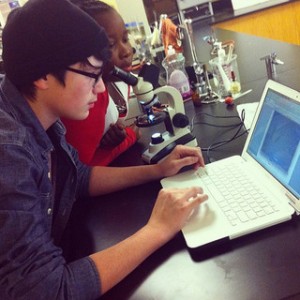From the Principal's Office: Necessary

[I often say, "Technology must be ubiquitous, necessary and invisible." I thought I'd take a little time to explore each item in that triptych. My first post was Ubiquitous. Here is my second in the series. -- Chris]
Technology must be necessary.
That seems like an easy one. It is hard to think of a part of American life that is not touched by technology today outside of our schools. And yet, most students today do not feel that a laptop or a tablet is absolutely necessary to their success inside of school. This despite over 68% of American households having broadband internet at home. (http://www.esa.doc.gov/Reports/exploring-digital-nation-computer-and-internet-use-home) But for some reason, we continue to expect kids to dutifully take notes in an analog fashion and cut themselves off from the world outside the walls of the classroom while they aren’t.
It is time to admit that technology must be a necessary component to learning in school. Let’s use something as simple as note taking as an example. Why would we make students handwrite notes in a classroom anymore? Today, when students have the ability to use a tool like Evernote or Google Docs, notes can be compiled, reorganized, and shared. The ability to filter and the ability to search means that students can reference and use their notes more quickly and powerfully than before. That doesn’t mean that every note has to be taken online, in fact I enjoy using the Evernote moleskin to take notes the old-fashioned way and then digitize them, but the idea that students could create an electronic repository of their notes, their ideas, their work, should not be revolutionary anymore. It should simply be necessary. It should simply be done.
But that is the low-hanging fruit. Technology is necessary for reasons far greater than a better way to take notes or write a paper. Technology is necessary in our schools because it allows our students to see their work is authentic in the world. No longer is student work simply a one-to-one dialogue between teacher and student. Students can publish their work, students can take part in communities of practice both inside and outside of their immediate school community, And students can see their work is adding to the larger dialogue about topics that are of importance to them. The first time a student at SLA received an email from someone asking a follow-up question about a project, his vision of himself as a scholar completely changed. Every time students see their videos make the rounds on twitter, they understand they have created a vision of the world that is shared. When students use social media to reach out to experts in their fields, students develop their ability to inquire deeply and interact with adults who are further along on that path of inquiry. When students use technology in a science classroom to do powerful experiments or in an engineering class to make their idea become real, students no longer are only learning science, learning engineering, they are becoming scientists and engineers.
Technology becomes necessary when students see it as vital to the way they learn, when they cannot imagine doing the work without it. It is necessary when it allows them to do things, learn things, create things and share things like never before. Technology becomes necessary when it makes the work students do more authentic, more empowering and shared to the world. And, as educators, isn’t that how we want our students to view the artifacts of their learning? Technology is necessary not just because it is vital to the lives our students — and our society — leads outside of school. It is necessary because it can be married to progressive pedagogy and used to help students become fully realized scholars of the world.
cross-posted at practicaltheory.org/blog.
Tools and ideas to transform education. Sign up below.
Chris Lehmann is the founding principal of the Science Leadership Academy, a progressive science and technology high school in Philadelphia, PA. that was recognized by Ladies Home Journal as one of the Ten Most Amazing Schools in the US and was recognized as an Apple Distinguished School in 2009 and 2010. Chris won the Lindback Award for Excellence in Principal Leadership in the School District of Philadelphia in April 2012, and has been honored by the White House as a Champion of Change for his work in education reform. In June 2010, Chris was named as one of the “30 Most Influential People in EdTech” by Technology & Learning Magazine. Read more at his blog, http://practicaltheory.org/blog.
